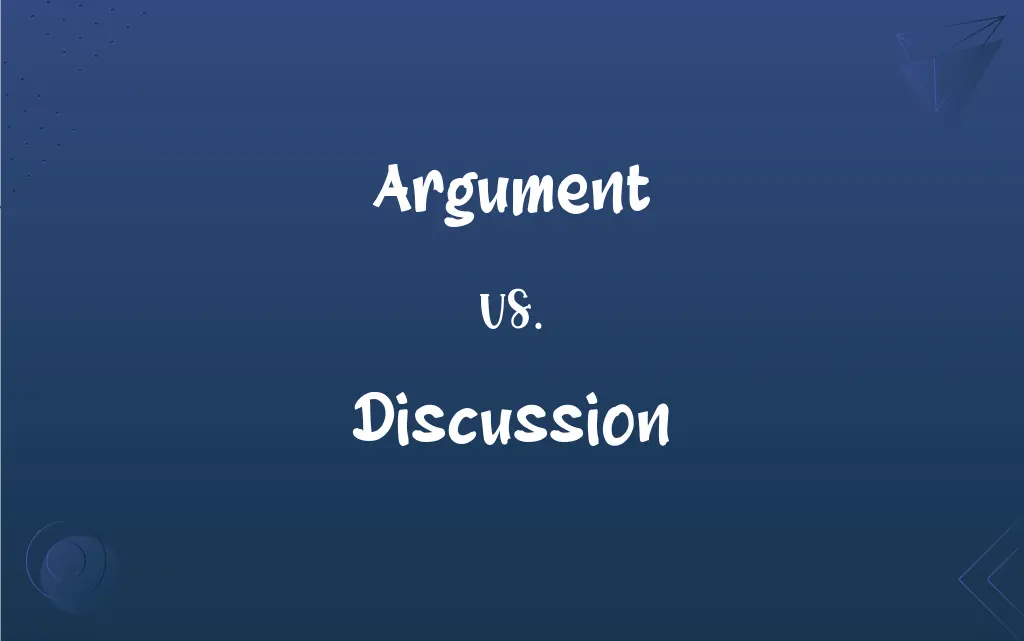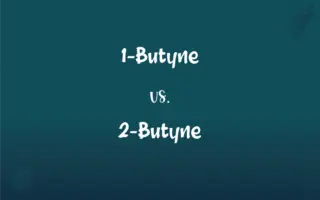Argument vs. Discussion: What's the Difference?
Edited by Aimie Carlson || By Janet White || Published on January 10, 2024
An argument is a conversation where opposing ideas are expressed, often heatedly, while a discussion is a general talk or debate without the connotation of conflict.

Key Differences
An argument typically involves a dispute where parties express opposing views, often with the intention of persuasion. A discussion, however, is characterized by a more cooperative exchange of ideas, aimed at understanding or exploring a topic.
Arguments can become emotional or confrontational, focusing on proving a point or winning the debate. Discussions tend to be calmer, with an emphasis on listening, learning, and considering multiple viewpoints.
In an argument, participants may use rhetoric and persuasion to support their viewpoints, sometimes leading to a clash of opinions. During a discussion, the approach is more about sharing information, insights, and experiences to gain a broader perspective.
Arguments often result in winners and losers, as the goal is to establish a dominant viewpoint. Discussions, conversely, aim to reach a consensus or mutual understanding, without necessarily having a winning side.
The tone of an argument can be aggressive and defensive, as parties assert their positions firmly. In discussions, the tone is usually open and respectful, fostering an environment of mutual respect and learning.
ADVERTISEMENT
Comparison Chart
Purpose
To persuade or prove a point
To explore or understand a topic
Tone
Often confrontational or heated
Generally cooperative and calm
Goal
Winning or proving a point
Gaining understanding or consensus
Emotional Tone
Can be aggressive or defensive
Respectful and open-minded
Approach
Use of rhetoric and persuasion
Sharing of information and views
ADVERTISEMENT
Argument and Discussion Definitions
Argument
An argument is a verbal dispute between people with opposing views.
Their argument over environmental policies lasted hours.
Discussion
A discussion is an act or instance of discussing; consideration or examination by argument, comment, etc.
The team had a lengthy discussion about the project's direction.
Argument
An argument can be a set of reasons given to persuade others that an action or idea is right or wrong.
She presented a compelling argument for renewable energy.
Discussion
In academia, a discussion is a detailed treatment of a particular topic in speech or writing.
The professor led the discussion on 19th-century literature.
Argument
Argument can also mean a contentious exchange.
The debate quickly turned into a heated argument.
Discussion
Discussion can be the process of talking about something, typically in order to reach a decision.
After much discussion, they agreed on a plan.
Argument
Argument refers to a summary of the main points of a theory or proposal.
The author's argument was outlined in the introduction of the book.
Discussion
Discussion refers to a formal debate.
The public discussion on climate change was enlightening.
Argument
In logic, an argument is a sequence of statements aimed at demonstrating the truth of an assertion.
His argument was based on well-established scientific principles.
Discussion
Discussion sometimes implies a casual conversation.
They struck up a friendly discussion about music.
Argument
A discussion in which the parties involved express disagreement with one another; a debate
Philosophical arguments over the nature of existence.
Discussion
Consideration of a subject by a group; an earnest conversation.
Argument
An angry discussion involving disagreement among the participants; a quarrel
The roommates had an argument about whose turn it was to wash the dishes.
Discussion
A formal discourse on a topic; an exposition.
Discussion
Conversation or debate concerning a particular topic.
There was then a long discussion of whether to capitalize words like "east".
This topic is not open to discussion.
My discussion with the professor was very enlightening.
Discussion
Text giving further detail on a subject.
Under each heading, you will find a discussion.
Discussion
The dispersion of a tumour.
Discussion
The act or process of discussing by breaking up, or dispersing, as a tumor, or the like.
Discussion
The act of discussing or exchanging reasons; examination by argument; debate; disputation; agitation.
The liberty of discussion is the great safeguard of all other liberties.
Discussion
An extended communication (often interactive) dealing with some particular topic;
The book contains an excellent discussion of modal logic
His treatment of the race question is badly biased
Discussion
An exchange of views on some topic;
We had a good discussion
We had a word or two about it
FAQs
Is a discussion always peaceful?
While discussions aim to be cooperative, they can sometimes become heated.
Can an argument be part of a discussion?
Yes, arguments can occur within a discussion as differing viewpoints are expressed.
Are arguments always negative?
Not necessarily; arguments can be constructive if managed respectfully.
What is an argument?
An argument is a verbal dispute or a reason given to support a viewpoint.
What is a discussion?
A discussion is a conversation or debate about a particular topic.
Can discussions lead to decisions?
Yes, discussions often aim to reach a decision or consensus.
Do arguments always resolve issues?
Not always; arguments can sometimes deepen conflicts instead of resolving them.
What makes a discussion effective?
Effective discussions involve active listening, respect, and open-mindedness.
Are discussions beneficial in a workplace?
Yes, discussions can foster understanding and creativity in a workplace.
Can an argument be constructive?
Yes, constructive arguments can lead to new insights and solutions.
Can arguments be avoided?
It's challenging to completely avoid arguments, but they can be managed constructively.
Is it possible to have a discussion without arguments?
Yes, discussions can occur without arguments, especially when participants are open-minded.
What is the role of a moderator in a discussion?
A moderator helps guide the discussion, ensuring all voices are heard and the conversation stays on track.
How can one avoid arguments turning negative?
By maintaining respect, staying calm, and focusing on understanding rather than winning.
Can discussions be informal?
Yes, discussions can be both formal and informal.
How do you end an argument effectively?
By finding common ground, agreeing to disagree, or taking a break from the discussion.
Is it important to have both discussions and arguments?
Yes, both are important for a healthy exchange of ideas and perspectives.
How do you start a discussion?
A discussion can be started by introducing a topic and inviting opinions.
Can arguments damage relationships?
Yes, if not handled properly, arguments can strain or damage relationships.
Are all discussions productive?
Not all discussions are productive, especially if participants are not genuinely engaged.
About Author
Written by
Janet WhiteJanet White has been an esteemed writer and blogger for Difference Wiki. Holding a Master's degree in Science and Medical Journalism from the prestigious Boston University, she has consistently demonstrated her expertise and passion for her field. When she's not immersed in her work, Janet relishes her time exercising, delving into a good book, and cherishing moments with friends and family.
Edited by
Aimie CarlsonAimie Carlson, holding a master's degree in English literature, is a fervent English language enthusiast. She lends her writing talents to Difference Wiki, a prominent website that specializes in comparisons, offering readers insightful analyses that both captivate and inform.






































































